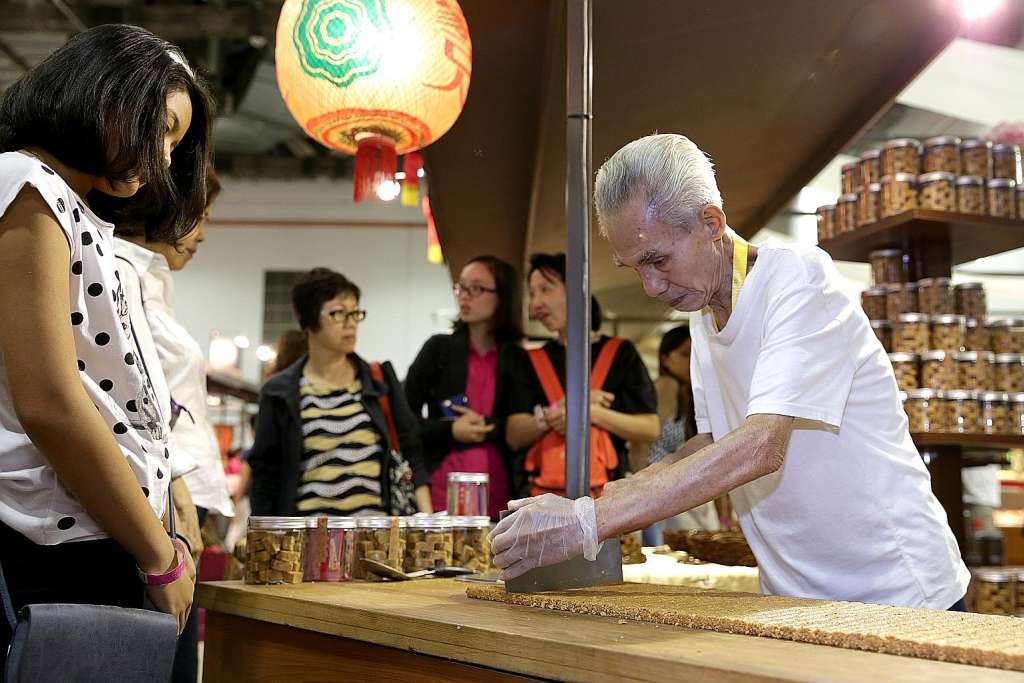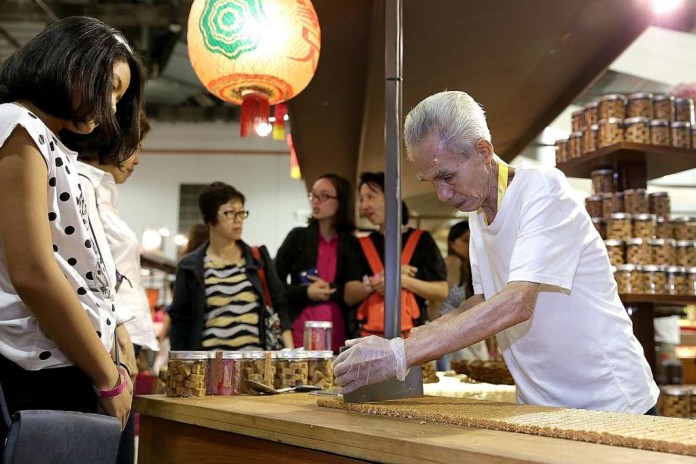Jay Kok is not your usual 12 year old. Unlike most kids, he has a passion for dialects, specifically Teochew, the first language he was taught at home.
Jay, who was helping his aunt at her Thye Moh Chan baked goods stall yesterday at the Teochew Festival at the Marina Bay Sands Expo and Convention Centre Hall A, thinks it is important to “pass on the Teochew heritage, or no one would speak Teochew (any more)”.
Jay, who will enter secondary school next year, is the kind of young person festival organiser Teochew Poit Ip Huay Kuan probably hopes to see more of.
With the youth in mind, the organiser has introduced several initiatives to make the 10-day festival appealing to a younger audience.
Efforts to woo younger Teochews include a Teochew-rapping hip-hop group from Shantou and the Heng Heng app which aims to teach the correct pronunciations of traditional Teochew kueh. These are part of a larger effort to promote Teochew culture and heritage.
There are an estimated 500,000 Teochews in Singapore, the second-largest Chinese sub-group, after the Hokkiens. The Teochews, originally from eight counties in China’s southern Chaoshan region, first arrived in Singapore in the early 1800s.
The festival, which is into its second edition, was officially opened by Minister for Health Gan Kim Yong yesterday. It aims to attract more than 150,000 visitors this year, up from 100,000 in 2014.
Teochew Poit Ip Huay Kuan president George Quek, 61, better known as the founder of the BreadTalk group chain, said that the Teochew clan association has nearly 5,000 members. This includes more than 400 young people – up from 200 in 2013.
Dr Peter Lim, the association’s vice-president, youth committee chairman and the festival’s organising chairman, attributes the increase to events such as singing contests, sports events and reading groups that attract younger people. Sharing sessions, during which young people could learn from older Teochews, have also helped – with many appreciating the chance to meet and network, sometimes with successful, prominent members of the community.
He said: “We need to ask… what can we do for younger people… If we give them networking opportunities, or give them valuable life experiences, or learning or art programmes, we will attract them.”
He added that events like the festival provide a platform for which Teochew culture can be on display.He said: “We want younger generations to think that learning Teochew is cool. It is an ancient language. It’s a beautiful language, and sounds melodious and gentle. Many people think Teochew stage shows are things only grandparents watch. But actually the performance skills are brilliant.”
He added that Teochews throughout history have been known to be able to “take hardship, persevere, study hard and value education”. He hopes that the festival will “inspire the younger generation to learn from their elders’ enterprising initiative”.
From vendors selling bak kut teh to opera performances, Teochew culture and way of life is on show. To capture authentic Teochew food, some vendors flew in ingredients from China to make specific kueh and oyster omelette.
Other highlights include daily performances by the award-winning Xiao Mei Hua Opera Troupe from Jieyang, China, and a cultural zone displaying artefacts from Teochew immigrants here in the 1800s and 1900s.
For many seniors, the festival was a chance to walk down memory lane. One of them was Madam Tan Chang Hua, 65, a Teochew Singaporean whose ancestors were from Swatow. Pointing to the food stalls and stage where the opera troupe had performed just minutes earlier, she said: “I get to reminisce about my childhood, when I used to watch Teochew stage shows.”
The Teochew clan association is optimistic there will be enough demand for the festival to run a third time. Said the deputy chairman of its youth committee, Mr Huang Liang, 33: “I think Singapore’s Teochew festival is very suited to young people’s tastes. And we want to have more young people, so the festival becomes more current and youthful.”
• Teochew Festival 2016 runs at the Sands Expo and Convention Centre till Dec 18. Tickets cost $10 per day. For more information, visit www.teochewfestival.com

This article was first published on Dec 10, 2016.
Get a copy of The Straits Times or go to straitstimes.com for more stories.







